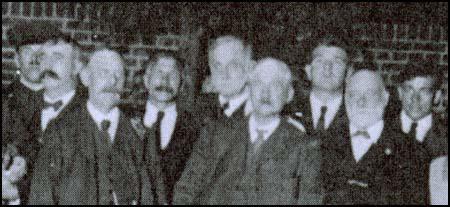Edgar Lansbury
Edgar Lansbury, the son of George Lansbury, was born in 1887. He grew up in Poplar in the East End of London, and joined the Civil Service at a young age. In 1910, he left, to set up a timber merchants with his brother, Willie Lansbury.
A member of the Labour Party he was elected to Poplar Council in 1912. He married Minnie Glassman, the daughter of Jewish coal merchant, Isaac Glassman, in 1914.
In November 1919 the Labour Party won 39 of the 42 council seats on Poplar Council. In 1921 Poplar had a rateable value of £4m and 86,500 unemployed to support. Whereas other more prosperous councils could call on a rateable value of £15 to support only 4,800 jobless. George Lansbury proposed that the Council stop collecting the rates for outside, cross-London bodies. This was agreed and on 31st March 1921, Poplar Council set a rate of 4s 4d instead of 6s 10d. On 29th the Councillors were summoned to Court. They were told that they had to pay the rates or go to prison. At one meeting Millie Lansbury said: "I wish the Government joy in its efforts to get this money from the people of Poplar. Poplar will pay its share of London's rates when Westminster, Kensington, and the City do the same."
On 28th August over 4,000 people held a demonstration at Tower Hill. The banner at the front of the march declared that "Popular Borough Councillors are still determined to go to prison to secure equalisation of rates for the poor Boroughs." The Councillors were arrested on 1st September. Five women Councillors, including Julia Scurr, Millie Lansbury and Susan Lawrence, were sent to Holloway Prison. Twenty-five men, including Edgar Lansbury, George Lansbury and John Scurr, went to Brixton Prison. On 21st September, public pressure led the government to release Nellie Cressall, who was six months pregnant. Julia Scurr reported that the "food was unfit for any human being... fish was given on Friday, they told us, that it was uneatable, in fact, it was in an advanced state of decomposition".
Instead of acting as a deterrent to other minded councils, several Metropolitan Borough Councils announced their attention to follow Poplar's example. The government led by Stanley Baldwin and the London County Council was forced to back down and on 12th October, the Councillors were set free. The Councillors issued a statement that said: "We leave prison as free men and women, pledged only to attend a conference with all parties concerned in the dispute with us about rates... We feel our imprisonment has been well worth while, and none of us would have done otherwise than we did. We have forced public attention on the question of London rates, and have materially assisted in forcing the Government to call Parliament to deal with unemployment."While in Holloway Prison Edgar's wife, Millie Lansbury, developed pneumonia and she died on 1st January 1922. According to Janine Booth she had told friends " that imprisonment had weakened her physically, leaving her body unable to fight off the illness that killed her." Her father-in-law, George Lansbury said: "Minnie, in her 32 years, crammed double that number of years' work compared with what many of us are able to accomplish. Her glory lies in the fact that with all her gifts and talents one thought dominated her whole being night and day: How shall we help the poor, the weak, the fallen, weary and heavy-laden, to help themselves? When, a soldier like Minnie passes on, it only means their presence is withdrawn, their life and work remaining an inspiration and a call to us each to close the ranks and continue our march breast forward."

In the 1923 General Election, John Scurr, Susan Lawrence and George Lansbury were all elected to the House of Commons.The Labour Party won 191 seats. Although the Conservative Party had 258 seats, Herbert Asquith announced that the Liberal Party would not keep the Tories in office. If a Labour Government were ever to be tried in Britain, he declared, "it could hardly be tried under safer conditions".
On 22nd January, 1924 Stanley Baldwin resigned. At midday, Ramsay MacDonald went to Buckingham Palace to be appointed prime minister. MacDonald had not been fully supportive of the Poplar Councillors since he thought that "public doles, Popularism, strikes for increased wages, limitation of output, not only are not Socialism but may mislead the spirit and policy of the Socialist movement." George Lansbury was therefore not offered a post in his Cabinet.
John Wheatley, the new Minister of Health, had been a supporter of the Poplar Councillors. Edgar Lansbury wrote in The New Leader that he was sure that Wheatley would "understand and sympathise with them in this horrible problem of poverty, misery and distress which faces them." Lansbury's assessment was correct and as Janine Booth, the author of Guilty and Proud of It! Poplar's Rebel Councillors and Guardians 1919-25 (2009), has pointed out: "Wheatley agreed to rescind the Poplar order. It was a massive victory for Poplar, whose guardians had lived with the threat of legal action for two years and were finally vindicated."
Lansbury joined the Communist Party of Great Britain. In 1923 the actor, Reginald Denham, named Lansbury as co-respondent when he filed for divorce against his wife Moyna Macgill. The following year Edgar Lansbury married Macgill. The couple had three children, including the actress, Angela Lansbury. When he served as mayor of Poplar in 1924-25, he became only the second communist in Britain to hold this positon. He was also Chairman of the Poplar Board of Guardians.
Edgar Lansbury died of stomach cancer on 28th May 1935.
